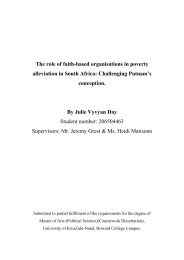View/Open - ResearchSpace - University of KwaZulu-Natal
View/Open - ResearchSpace - University of KwaZulu-Natal
View/Open - ResearchSpace - University of KwaZulu-Natal
You also want an ePaper? Increase the reach of your titles
YUMPU automatically turns print PDFs into web optimized ePapers that Google loves.
they wore gloves or masks. In some instances, volunteer caregivers lied to their clients that<br />
they were wearing masks and gloves because they were sick and that they did not want to<br />
infect their clients. They also <strong>of</strong>fered education to family members and the patient on the<br />
importance <strong>of</strong> wearing protective clothing:<br />
“To those that do not like it, we explain to them that it is not because we are disgusted, but it<br />
is because you also need to be protected my diseases. Others understand after you explain.<br />
We tell them that even doctors and nurses always use gloves. But others do not like it, and<br />
they feel as if you are disgusted they will just look at you disapprovingly so you just touch<br />
them with your bare hands and not protect yourself and say that God will help me through<br />
this challenge and he knows that I am trying to help.” (Focus group 1, organisation A)<br />
One particular participant said that, she felt angry and unappreciated by the patients and<br />
family members who did not want her to use gloves or masks. Therefore on one incident she<br />
could not care or hold her anger or tell lies but she told her patient the truth as to why she<br />
wore the mask:<br />
“… I told her <strong>of</strong> that it’s because you have messed yourself, so the smell <strong>of</strong> this shit will affect<br />
me and the patient understood” (Focus group 8, organisation H)<br />
4.6.5 HIV/AIDS related stigma causing more burdens on volunteer caregivers<br />
HIV/AIDS related stigma is still evident and is encountered by most <strong>of</strong> the volunteer<br />
caregivers in their communities while performing their duties. HIV/AIDS still carries a<br />
stigma. It is still seen as a taboo by some religious groups. Some patients are neglected by<br />
their family members. Some people do not to go for voluntary testing and counselling (VCT).<br />
Some do not know or disclose their status. Some who know their HIV status do not access<br />
treatment and shun help from volunteer caregivers. In such circumstances volunteer<br />
caregivers may have less access to their clients. They cannot practice infection control. As<br />
result the health <strong>of</strong> the clients deteriorates. This can cause more infections and also cause<br />
death:<br />
“People in this area take T.B and HIV/AIDS as a shame. Some families don’t want to help<br />
the patients. They locked them up inside their houses. Families do not want them to come out<br />
and talk or be seen by people. They don’t care whether the person has eaten or not. They just<br />
want the person to die quickly. And if the patients wet or soil themselves, they are beaten and<br />
some are denied food so you will find him or her in that same condition the next day. You will<br />
find that now they have developed sores because they have been doing everything on<br />
53
















